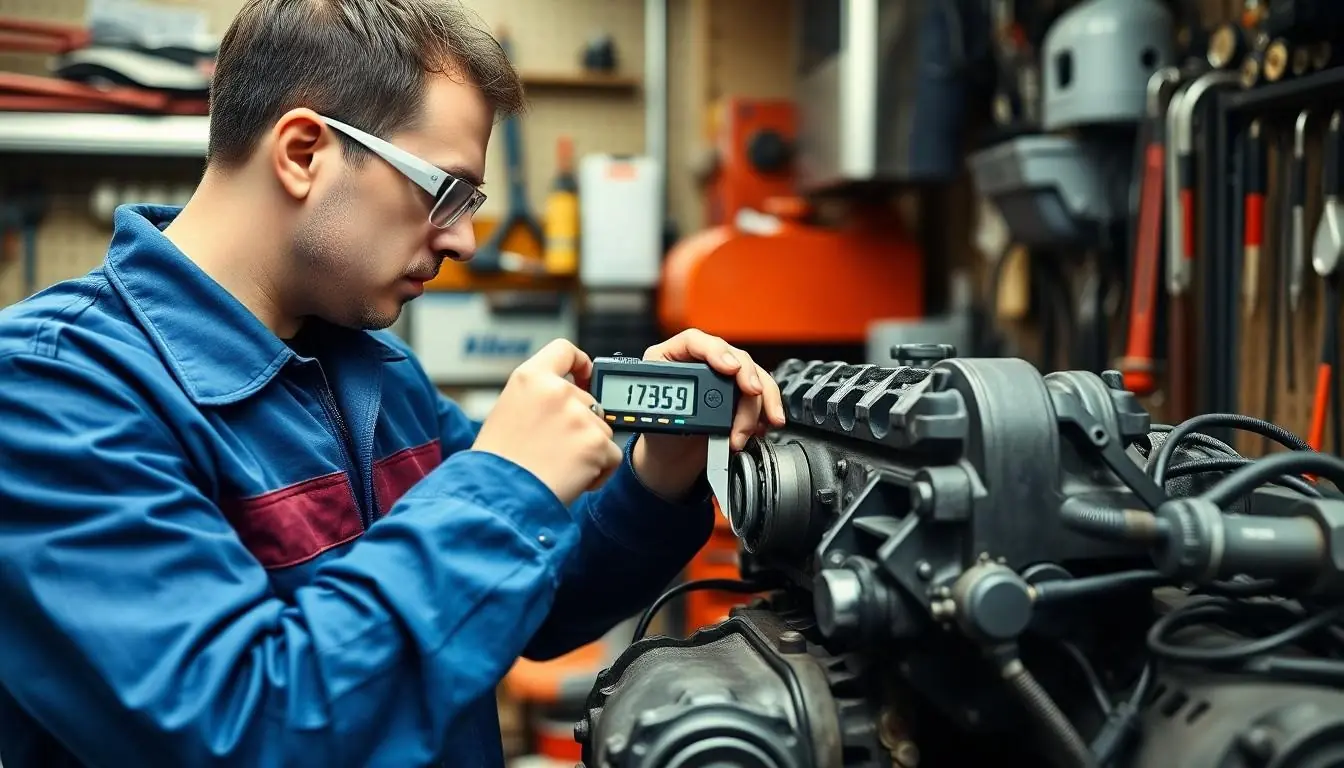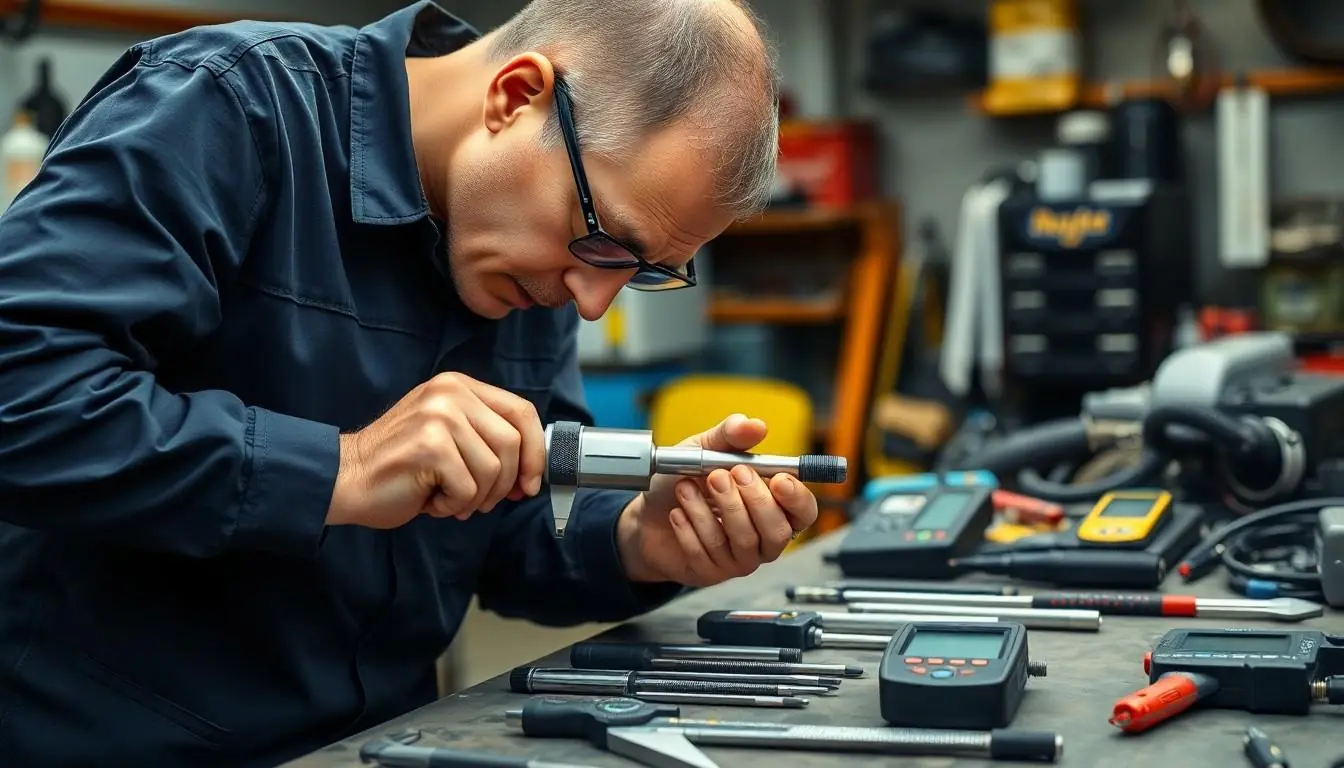In the world of automotive repair, precision is king. Without the right measuring tools, even the most seasoned mechanics can feel like a chef without a knife—attempting to slice a tomato with a spoon. Automotive measuring tools aren’t just fancy gadgets; they’re the unsung heroes of the workshop, ensuring that every part fits like a glove and every adjustment is spot on.
Imagine trying to align a car’s suspension with nothing but a ruler and a prayer. Spoiler alert: it won’t end well. From calipers to torque wrenches, these tools make the difference between a smooth ride and a bumpy adventure. Whether you’re a DIY enthusiast or a professional mechanic, investing in quality measuring tools is like giving your car a GPS for the road ahead—taking you straight to success without the detours.
Table of Contents
ToggleOverview of Automotive Measuring Tools
Automotive measuring tools play a vital role in ensuring precision and accuracy in vehicle maintenance. These tools significantly impact the quality of repairs and adjustments.
Importance in the Automotive Industry
Precision directly influences vehicle performance and safety. Automotive measuring tools enable technicians to make accurate measurements, ensuring components fit properly. Quality tools reduce the risk of errors during repairs, which can lead to costly mistakes. Investing in reliable measuring tools reflects a commitment to high-quality service and customer satisfaction. Vehicles often have complex systems, requiring detailed measurements for proper function. Professionals rely on these tools to maintain industry standards and comply with regulations.
Common Types of Measuring Tools
Many types of measuring tools are commonly used in the automotive field. Calipers help measure outside, inside, and depth dimensions of components with high accuracy. Torque wrenches play a crucial role in applying precise torque to bolts and fasteners, ensuring proper assembly. Gauge tools assist in checking the wear and alignment of various parts. Rulers and measuring tapes provide basic linear measurements for larger components. Digital measuring tools, such as laser distance meters, enhance ease of use and precision. Each tool serves a specific purpose, contributing to successful maintenance and repair work.
Types of Automotive Measuring Tools

Automotive measuring tools come in various types, each designed to ensure accuracy in repairs and maintenance. Understanding these types helps mechanics select the right tool for the job.
Handheld Measuring Tools
Handheld measuring tools offer simplicity and portability. Common examples include tape measures, calipers, and micrometers, each providing precise measurements for various components. Calipers measure internal and external dimensions accurately, while micrometers gauge thickness with high precision. Technicians often prefer using tape measures for larger areas, like bodywork. These tools enable quick assessments on-site and help in adjusting parts for optimal fit during repairs.
Electronic Measuring Tools
Electronic measuring tools enhance efficiency and accuracy in automotive work. Digital calipers, laser distance measurers, and electronic torque wrenches represent notable examples. Digital calipers offer easy-to-read displays, while laser distance measurers provide quick readings for longer distances. Electronic torque wrenches ensure that specifications are met without guesswork, reducing the risk of over-tightening or under-tightening. By using these advanced tools, mechanics can streamline their workflow and verify measurements accurately in real-time.
Specialty Measuring Tools
Specialty measuring tools cater to specific tasks within automotive repair. Examples include compression testers, wheel alignment gauges, and brake rotor gauges. A compression tester evaluates engine health by measuring cylinder pressure, which aids in diagnosing engine issues. Alignment gauges help in adjusting wheels to manufacturer specifications, improving vehicle handling. Brake rotor gauges measure the surface wear of rotors, ensuring proper brake performance. Utilizing these specialty tools contributes significantly to thorough inspections and effective repairs.
Selecting the Right Automotive Measuring Tools
Choosing the right automotive measuring tools enhances precision and accuracy during vehicle maintenance. Several factors play a critical role in this selection process.
Factors to Consider
Durability should top the list when selecting measuring tools. Tools frequently exposed to harsh conditions require robust materials. Precision features also matter; look for tools that guarantee consistent accuracy across different measurements. Usability is essential, as intuitive designs streamline operations. Mechanic experience levels determine tool complexity; beginners may favor simple handheld devices, while seasoned professionals often opt for advanced electronic tools. Additionally, consider the specific tasks at hand. Certain tools excel in particular applications, such as torque wrenches for proper tightness in bolts or calipers for precise part measurements.
Recommended Brands and Models
Several brands stand out in the automotive measuring tool market. Mitutoyo consistently ranks high due to its reputation for precision in calipers and micrometers. Craftsman offers an excellent range of durable and user-friendly handheld tools, appealing to both enthusiasts and professionals. For digital measuring devices, Neiko provides reliable options that enhance efficiency. Precision Instruments stands out for torque wrenches, known for their accuracy and ease of use. Finally, Starrett presents specialty tools highly regarded for specific automotive applications, from gauges to inspection tools. Each brand and model brings unique features tailored to various measuring needs.
Maintenance and Calibration of Tools
Maintaining and calibrating automotive measuring tools ensures accuracy and longevity. Regular upkeep is essential to guarantee precise measurements in vehicle maintenance.
Regular Maintenance Practices
Regular maintenance of tools enhances their reliability. Inspect tools frequently for signs of wear and damage. Clean measuring devices after each use to prevent dirt buildup that can affect performance. Store tools properly in protective cases or drawers to prevent impact or exposure to elements. Track the usage frequency as this can determine potential service needs. Implementing these practices promotes accuracy and extends the lifespan of the tools.
Calibration Techniques
Calibration techniques directly influence measurement precision. Verify tools against known standards at least once a year. Use calibration blocks, gauges, or specialized equipment to check for discrepancies. Adjust tools as necessary, following the manufacturer’s guidelines. Document calibration dates and results for tracking purposes. Employing these techniques increases confidence in measurement accuracy, which is crucial for successful automotive repairs.
Automotive measuring tools are indispensable for anyone involved in vehicle maintenance and repair. Their precision directly impacts not only the quality of repairs but also the safety and performance of vehicles. By investing in reliable tools and adhering to proper maintenance practices, mechanics can ensure accuracy and longevity in their work. Selecting the right tools tailored to specific tasks enhances efficiency and effectiveness, ultimately leading to greater customer satisfaction. Whether for a professional shop or a DIY enthusiast’s garage, the right measuring tools make all the difference in achieving successful automotive outcomes.

